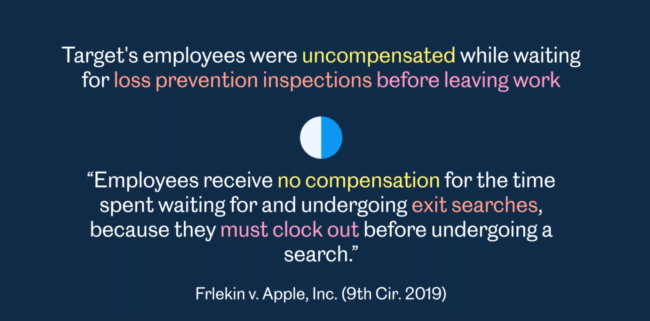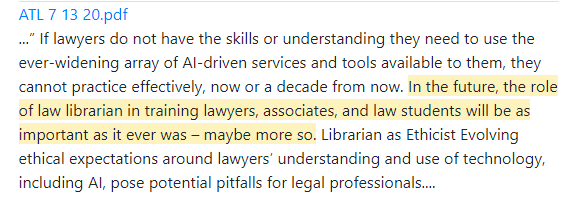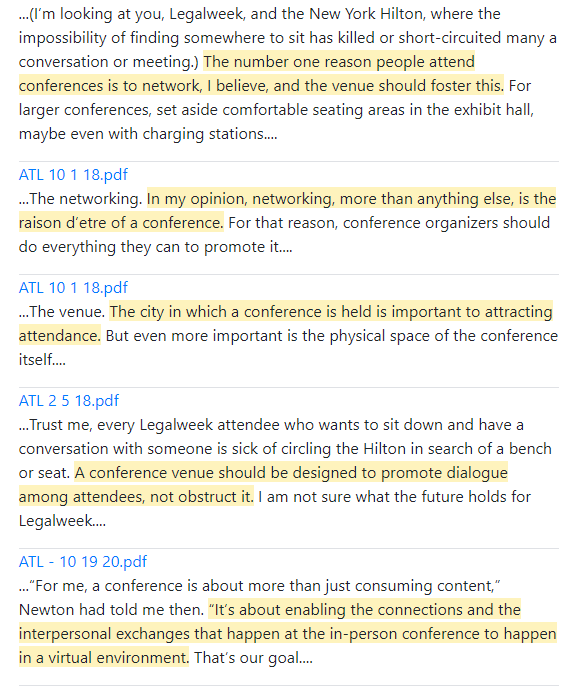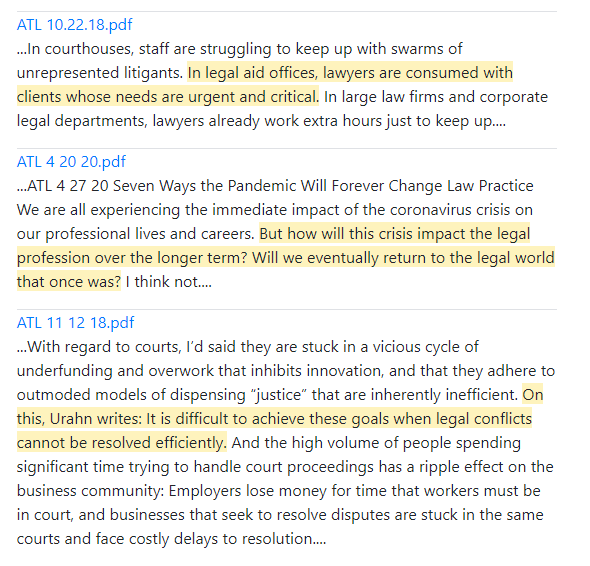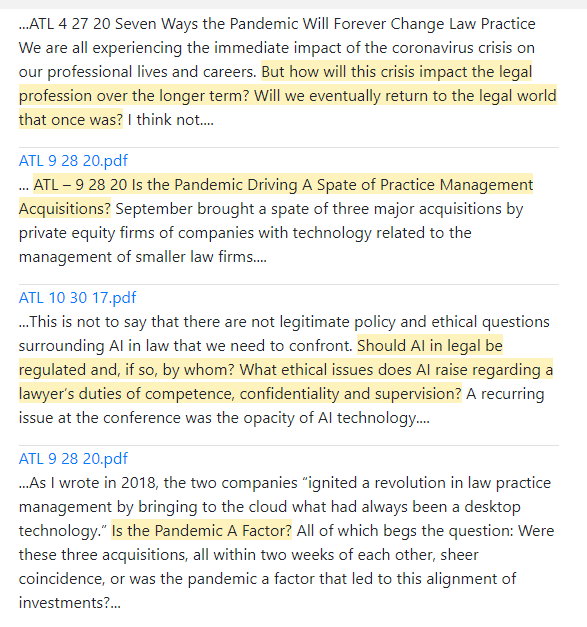Last year, the legal research company Casetext launched Compose, a first-of-its-kind product that uses artificial intelligence to help create the first draft of a litigation brief in a fraction of the time it would normally take.
Interest in Compose was so great that it somewhat overshadowed Casetext’s release of a product that formed a core component of Compose, called Parallel Search, a powerful tool for finding conceptually related cases, even when they contain no matching keywords.
Now, Casetext is offering the power of Parallel Search through a new product, WeSearch, that lets users upload and search their own document sets — meaning you can use it to search anything from enterprise contracts to e-discovery collections to prior art to deposition transcripts.
Some Background
I’ve previously described Parallel Search as the secret sauce of Compose. Within Compose, it uses an advanced neural network-based technique for natural language processing to to follow you as you draft a brief and automatically provide you with conceptually relevant precedent.
What is remarkable about Parallel Search is its ability to go beyond traditional notions of keyword searching, finding conceptually analogous caselaw even when the cases do not use the same language.
It is based on the open-source neural network framework developed by Google called Bidirectional Encoder Representations from Transformers, or simply BERT.
Pablo Arredondo, Casetext’s cofounder and chief product officer, told me that compared to Parallel Search, “what others called natural language search was just casual Fridays in the keyword prison.”
In a prior post about Compose, I shared several examples provided by Casetext of how Parallel Search is able to “understand” words and sentences in context. For example, this statement was entered into Parallel Search:
“Target’s employees were uncompensated while waiting for loss prevention inspections before leaving work.”
Parallel Search returned the following statement from the case Frlekin v. Apple Inc. (9th Cir. 2020):
“Employees receive no compensation for the time spent waiting for and undergoing exit searches, because they must clock out before undergoing a search.”
Thus, Parallel Search understood that “uncompensated” was the same as “no compensation,” that “loss prevention inspections” were similar to “exit searches,” and that “before leaving work” was similar to “must clock out.”
Recognizing the usefulness of this tool, Casetext subsequently made it a standalone product for searching its caselaw collection.
From Searching Cases to Searching Anything
This new product, WeSearch, takes the power of Parallel Search and extends it to virtually any collection of documents you want to throw at it. Simply upload a collection of documents, give WeSearch some time to process it, and then the collection is fully searchable using either Parallel Search or standard keyword search.
You can upload multiple collections of documents. WeSearch considers each separate collection of documents to be a “search engine,” and you can give each search engine whatever name you wish. Once you’ve created a search engine, you can continue to add files.
The types of files you can upload are PDF, Word and text (.pdf, .doc, .docx or .txt). Casetext says it can help users convert other file types so that they can be searched in WeSearch.
For each search engine, the total file size is limited to 50MB.
Playing with WeSearch
Yesterday, I spent some time playing with WeSearch. I say “playing” because I did not have ready access to a substantive document set that I could upload and search, so I uploaded several years worth of the column I write for Above the Law. I wanted to see how WeSearch would work in identifying concepts, so I tried feeding it some questions.
My first question was: “What will law practice be like in the future?”
Here are some of the results it delivered (the highlighting is in the result):
This first one struck me as fairly impressive. It drew a correlation between “law practice” and the “legal profession” and between “in the future” and “over the longer term.”
This one might have been a bit easier, given that both my query and this result use “law practice.” But nowhere does the result expressly talk about “the future,” even though that is what I asked about and what the result was intended to reference.
Here’s one more of the results it delivered:
I then asked, “Does a lawyer have a responsibility to understand technology?”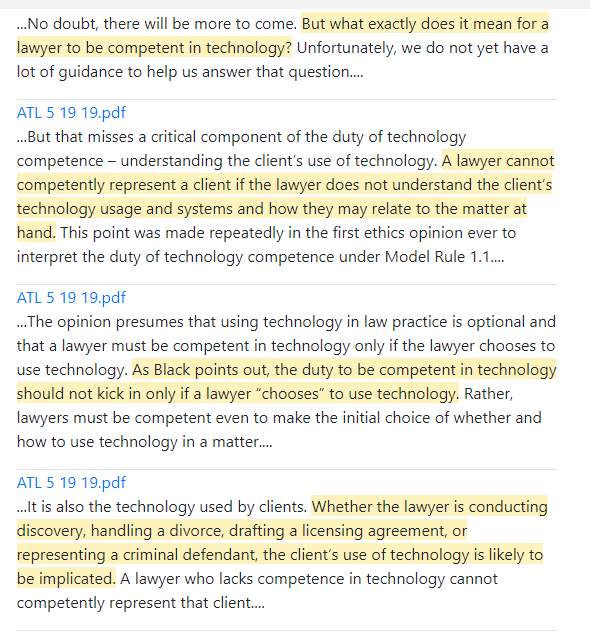
As you can see, WeSearch was able to equate concepts such as “understand” and “competence,” and to further equate the idea of a lawyer’s responsibility to the lawyer’s representation of clients.
My next question was: “What are the elements that make a conference worth attending?”
These were the top-five results for this question, and all seemed to show an understanding of the concept of my question. The second one struck me as particularly impressive, equating my question about what makes a conference worth attending to the concept of “the raison d’etre of a conference.”
I decided to give it a tougher question, so I asked, “What are the greatest challenges facing the legal profession?”
The first result here is striking. To my question about the greatest challenges facing the legal profession, it delivered a result about courts overwhelmed with unrepresented litigants and legal aid offices overrun with clients urgently needing help. Note that nowhere in the result do you see the question’s words “challenges” and “legal profession,” yet the result is dead on in terms of relevance.
My final question was: “What will be the pandemic’s impact on the delivery of legal services?”
As you can see, WeSearch is not perfect. The third result was irrelevant to my query. But the others were spot on.
Bottom Line
There are many potential ways legal professionals can use WeSearch. Casetext offers these suggestions:
- Knowledge management. Search for concepts in your own brief bank or personal document management system.
- Contracts. Input a contract term and instantly pull up the same term in other contracts, even if phrased differently.
- E-discovery. Add conceptual search to your discovery workflow, or find relevant content within your own collection.
- Transcripts. Search transcripts to find the testimony you need, without having to remember the exact words the witness used.
- Litigation record. Find the information or documents you need in a pending litigation.
- Prior art. Upload patents and articles and quickly find specific language to help invalidate a patent-in-suit.
This will be a paid product. But anyone can sign up and try it free for seven days.
So what do you have to search? Whatever it is, I suggest you give this a try.
 Robert Ambrogi Blog
Robert Ambrogi Blog
